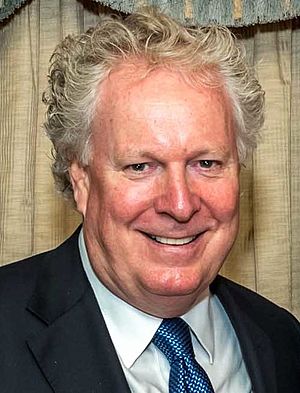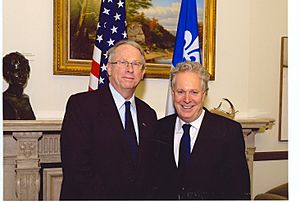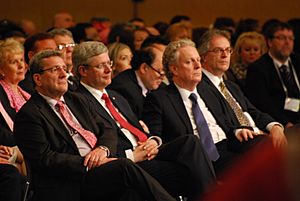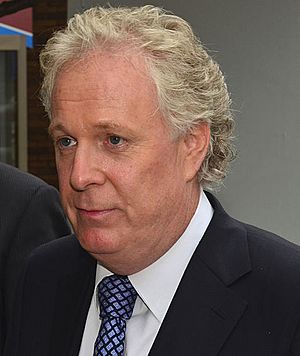Jean Charest facts for kids
Quick facts for kids
Jean Charest
|
|||||||||||||||||||||||||||||||||||||||||||||||||
|---|---|---|---|---|---|---|---|---|---|---|---|---|---|---|---|---|---|---|---|---|---|---|---|---|---|---|---|---|---|---|---|---|---|---|---|---|---|---|---|---|---|---|---|---|---|---|---|---|---|

Charest in 2017
|
|||||||||||||||||||||||||||||||||||||||||||||||||
| 29th Premier of Quebec | |||||||||||||||||||||||||||||||||||||||||||||||||
| In office April 29, 2003 – September 19, 2012 |
|||||||||||||||||||||||||||||||||||||||||||||||||
| Monarch | Elizabeth II | ||||||||||||||||||||||||||||||||||||||||||||||||
| Lieutenant Governor |
|
||||||||||||||||||||||||||||||||||||||||||||||||
| Deputy |
See list
Monique Gagnon-Tremblay
Jacques Dupuis Nathalie Normandeau Line Beauchamp Michelle Courchesne |
||||||||||||||||||||||||||||||||||||||||||||||||
| Preceded by | Bernard Landry | ||||||||||||||||||||||||||||||||||||||||||||||||
| Succeeded by | Pauline Marois | ||||||||||||||||||||||||||||||||||||||||||||||||
| 5th Deputy Prime Minister of Canada | |||||||||||||||||||||||||||||||||||||||||||||||||
| In office June 25, 1993 – November 4, 1993 |
|||||||||||||||||||||||||||||||||||||||||||||||||
| Prime Minister | Kim Campbell | ||||||||||||||||||||||||||||||||||||||||||||||||
| Preceded by | Don Mazankowski | ||||||||||||||||||||||||||||||||||||||||||||||||
| Succeeded by | Sheila Copps | ||||||||||||||||||||||||||||||||||||||||||||||||
|
|||||||||||||||||||||||||||||||||||||||||||||||||
|
|||||||||||||||||||||||||||||||||||||||||||||||||
|
|||||||||||||||||||||||||||||||||||||||||||||||||
|
|||||||||||||||||||||||||||||||||||||||||||||||||
| Personal details | |||||||||||||||||||||||||||||||||||||||||||||||||
| Born |
John James Charest
June 24, 1958 Sherbrooke, Quebec, Canada |
||||||||||||||||||||||||||||||||||||||||||||||||
| Political party | Conservative (federal) Quebec Liberal (provincial) |
||||||||||||||||||||||||||||||||||||||||||||||||
| Other political affiliations |
Progressive Conservative (before 2003) | ||||||||||||||||||||||||||||||||||||||||||||||||
| Spouse |
Michèle Dionne
(m. 1980) |
||||||||||||||||||||||||||||||||||||||||||||||||
| Residences | Westmount, Quebec, Canada | ||||||||||||||||||||||||||||||||||||||||||||||||
| Alma mater | Université de Sherbrooke | ||||||||||||||||||||||||||||||||||||||||||||||||
Jean Charest (born June 24, 1958) is a Canadian lawyer and former politician. He was the 29th premier of Quebec from 2003 to 2012. Before that, he was a Member of Parliament (MP) from 1984 to 1998. He also led the Progressive Conservative Party of Canada from 1993 to 1998.
Contents
Early Life and Education
Jean Charest was born on June 24, 1958, in Sherbrooke, Quebec. His mother, Rita, was of Irish descent, and his father, Claude, was French Canadian. He studied law at the Université de Sherbrooke. In 1981, he became a lawyer.
Charest married Michèle Dionne on June 21, 1980. They have three children: Amélie, Antoine, and Alexandra. He speaks both French and English fluently.
Federal Politics (1984–1998)
Charest worked as a lawyer until he was elected as a Progressive Conservative MP. He won the election in the Sherbrooke area in 1984. From 1984 to 1986, he served as an Assistant Deputy Chair in the House of Commons of Canada.
Youngest Cabinet Minister
In 1986, at just 28 years old, Charest joined the government of Prime Minister Brian Mulroney. He became the Minister of State for Youth. This made him the youngest cabinet minister in Canadian history.
In 1988, he became the Minister of State for Fitness and Amateur Sport. He later resigned from this role in 1990.
Environmental Leadership
Charest returned to the cabinet as Minister of the Environment in 1991. In this role, he led Canada's team at the 1992 Earth Summit in Rio de Janeiro, Brazil. This was a big international meeting about protecting the environment.
Leading the Progressive Conservatives
When Prime Minister Mulroney decided to retire, Charest ran to become the leader of the Progressive Conservative Party in 1993. He came in second place to Kim Campbell. Charest then served as Deputy Prime Minister and Minister of Industry in Campbell's government.
After the 1993 election, where the Progressive Conservatives lost many seats, Charest became the party leader. He was one of only two MPs from his party to win a seat. He led the party to gain more seats in the 1997 election, mostly in Atlantic Canada.
Provincial Politics (1998–2012)
In 1998, Charest left federal politics to lead the Quebec Liberal Party. This party supports Quebec staying part of Canada. Many people hoped he could help the Liberals win against the Parti Québécois, which wanted Quebec to become its own country.
In the 1998 Quebec election, the Liberals got more votes than the Parti Québécois. However, the Parti Québécois won more seats and formed the government. Charest won his own seat in Sherbrooke.
Becoming Premier of Quebec
In April 2003, Charest led the Quebec Liberals to victory in the provincial election. They won enough seats to form a majority government, ending nine years of Parti Québécois rule. Charest became the Premier of Quebec. He promised to improve healthcare, cut taxes, and reduce government spending.

Economic and Environmental Policies
As Premier, Charest's government increased the Quebec sales tax (QST) several times. In 2007, Quebec became the first province in Canada to put a carbon tax on fuel. This tax helps reduce pollution.
Charest also supported free trade with the European Union. This led to a major trade agreement in 2016.
In 2011, his government launched the Plan Nord. This was a big plan to develop natural resources like mining and energy in northern Quebec. The goal was to create many jobs and bring in billions of dollars over 25 years.
Charest was a strong supporter of environmental protection. He pushed for Quebec to meet its own targets for reducing greenhouse gases. He also created the Sustainable Development Act, which helps protect the environment and biodiversity. In 2012, he received an award for his work on sustainable development.

Other Policies
Charest's government allowed some cities that had been merged together to hold votes to separate again. This was important for many communities.
He also worked to increase Quebec's presence on the international stage. Quebec gained representation at UNESCO, which is the cultural part of the United Nations. Charest also stated that Quebec was a "nation" and that this was something Quebecers defined for themselves.
2012 Student Protests
In 2011, Charest's government decided to raise tuition fees for universities in Quebec. This led to large student protests and strikes in 2012. Students boycotted classes to show their disagreement. The government passed a law, Bill 78, to limit protests, which caused more debate. This law was later cancelled by the next government.
Challenges and Inquiries
Charest's time as Premier faced some challenges. There were questions about how the Quebec Liberal Party was funded and about issues in the construction industry. In 2010, his former justice minister, Marc Bellemare, claimed he was pressured about appointing judges. Charest testified in an inquiry about this.
For a long time, Charest did not want to start a public inquiry into corruption in the construction industry. However, due to growing public demand, he finally launched the Charbonneau commission in 2012 to investigate these issues.
Elections as Premier
In the 2007 Quebec election, Charest's party won a minority government. This meant they had the most seats but not enough to control all decisions without support from other parties.
In November 2008, Charest called another election, saying Quebec needed a majority government during tough economic times. His party won, giving the Liberals a third straight term in power. This was the first time a party had won three consecutive terms in Quebec since the Quiet Revolution.
On August 1, 2012, Charest started his campaign for the 2012 Quebec election. His party focused on law and order, referring to the student protests. On September 4, Charest and his party lost the election. The Parti Québécois won the most seats, and the Quebec Liberal Party became the official opposition. Charest also lost his own seat in Sherbrooke, which he had held since 1984. The next day, he announced he would resign as leader of the Quebec Liberal Party.
After Being Premier
After leaving politics, Charest worked as a consultant. He advised Huawei on its plans for 5G networks in Canada. He also joined McCarthy Tétrault, a law firm, as a partner. In January 2024, Charest left McCarthy Tétrault and joined another legal group.
2022 Conservative Leadership Bid
On March 9, 2022, Charest announced he would run to become the leader of the Conservative Party of Canada. He had thought about running in 2020 but decided not to. In the 2022 leadership election, Charest finished second to Pierre Poilievre.
Honours
- 125th Anniversary of the Confederation of Canada Medal (1992)
- Queen Elizabeth II Golden Jubilee Medal (2002)
- Bavarian Order of Merit (2007)
- Commander of France's Legion of Honour (February 2, 2009)
| Ribbon bars of The Honourable Jean Charest | |||
|---|---|---|---|
See also
 In Spanish: Jean Charest para niños
In Spanish: Jean Charest para niños
- List of premiers of Quebec
- Politics of Canada
- Politics of Quebec
 | Madam C. J. Walker |
 | Janet Emerson Bashen |
 | Annie Turnbo Malone |
 | Maggie L. Walker |


